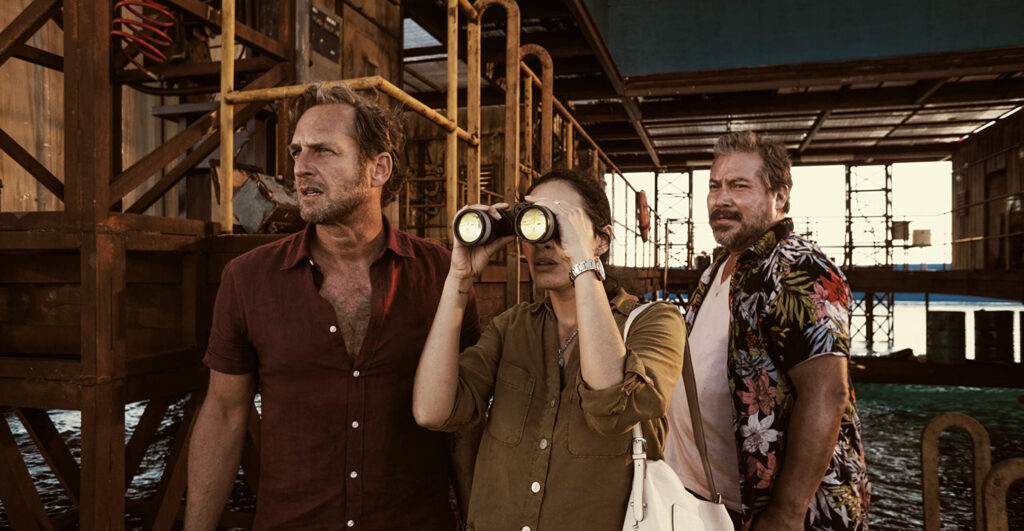“The Black Demon” Sinks in its Final Act

Nothing says the return of summer like a shark movie. From the gnashing teeth and imperiled swimmers to ignored warnings and an implausible climax; we can practically smell the blood and sunscreen. The first entry in this exciting subgenre is Adrian Grunberg’s The Black Demon, an ambitious film that blends folk horror with shark fright to make a statement about man’s destruction of the environment. Written by Carlos Cisco and Boise Esquerra, the story opens on a promising note with a demonic megalodon circling a crumbling oil rig. But the story falls apart in its final act with a heavy-handed message and an overly sentimental climax we’ve seen many times before. All of this could all be overlooked with some gnarly shark kills, but the film is much more focused on the human drama and its titular monster is suspiciously absent.
Paul (Josh Lucas) is a company man with Nixon Oil traveling with his family to Bahia Negra, Mexico to vacation while he inspects a struggling oil rig. Having done little more than pack up the car and hit the road, they’re shocked to find the nearby town fallen into ruin. Paul boards the rig which is similarly dilapidated. Even worse, the waters are haunted by the Black Demon, a sinister megalodon summoned by the angry god Tlaloc to protect the earth from capitalist destruction. In order to save his family and revive the surrounding town, Paul must defeat the demon shark and take his share of the blame for causing the devastation in the first place.
Regardless of how silly, shark movies will always be cool and the idea of a giant monster capable of defying the laws of nature sounds exciting. However, thrilling shark action is an absolute necessity. We need exciting kills, tense moments in the water, and plenty of canon fodder for the powerful jaws. Unfortunately the poster for The Black Demon shows more of the shark than we get to see in the film. The initial reveal promises breathtaking effects as the massive creature jumps out of the water to eat a speedboat. There are a few additional scenes of submerged peril, but the film seems to forget about the shark midway through the story. Grunberg teases an upsetting sacrifice, but shies away from the teeth of a devastating conclusion.
This omission feels especially egregious because the shark itself is so cool. Summoned by a vengeful god, this carnivorous predator is covered in scars and the oily black water provides the perfect setting for shadowy shark stalking. What’s more, this monster is a literal demon and would allow the filmmakers to ignore pesky problems like logic and plausible reality. Grunberg sets up an “anything goes” shark scenario then leaves it absolutely hanging to deal with a socially conscious message.
The message itself is an important one, though. Neglected for years, the leaking oil rig has destroyed the pristine beaches and once thriving town. The shark’s presence is a reaction to the kind of capitalist corruption currently wreaking havoc on our own world. However, the socially conscious themes hit like a mallet over the head and Paul explains his connection to the problem with a bizarre montage in which he chugs liquor and monologues. We see flashes of wildfires, oil spills, and general destruction leading to a conclusion so corny it’s hard to take seriously.
Lucas is an effective protagonist, though he’s failed by a clumsy script. It’s nearly impossible to get a read on who this character actually is, but Lucas fully commits to the role and cannot be faulted for his increasingly histrionic demeanor. The remaining roles are well acted from Fernanda Urrejola’s pitch perfect portrayal of a nervous mother to Julio Cesar Cedillo and Jorge A. Jimenez as the likable rig workers stranded on the decrepit structure. Venus Ariel and Carlos Solórzano are also wonderful as Paul’s two children. With strong chemistry, they provide just the right note of juvenile irritation without ever becoming so annoying that we wish for them to become shark food. The real problem with this cast is that it’s way too small. More employees would allow for added shark action and extra opportunities for helpless victims to fall into the jaws of certain death.
The Black Demon starts off on a promising note with an intriguing shark and a unique setup. The connection to real folklore allows the premise to stand out in a sea of similar genre films. Unfortunately, The Black Demon doesn’t stick the landing. Grunberg can’t seem to decide what kind of film he’s making and the third act turns into a waterlogged mess. Again, all of this could be overlooked with some exciting shark action, but what we get is a standard disaster movie that forgets it should be following a shark.
Jenn Adams is a writer, podcaster, and film critic from Nashville, TN. Find her social media nonsense @jennferatu.